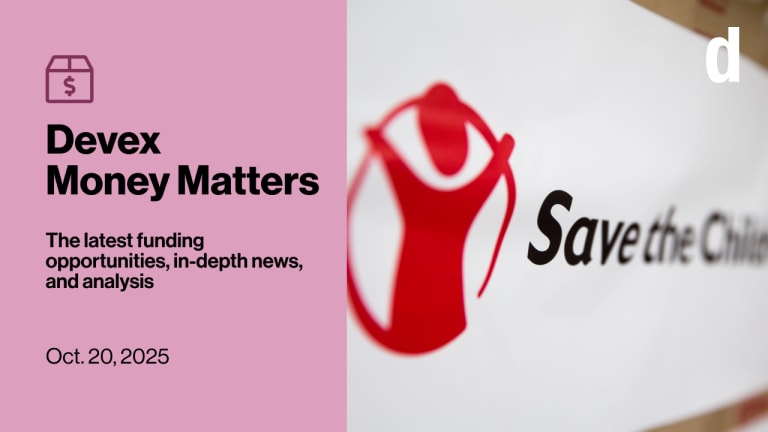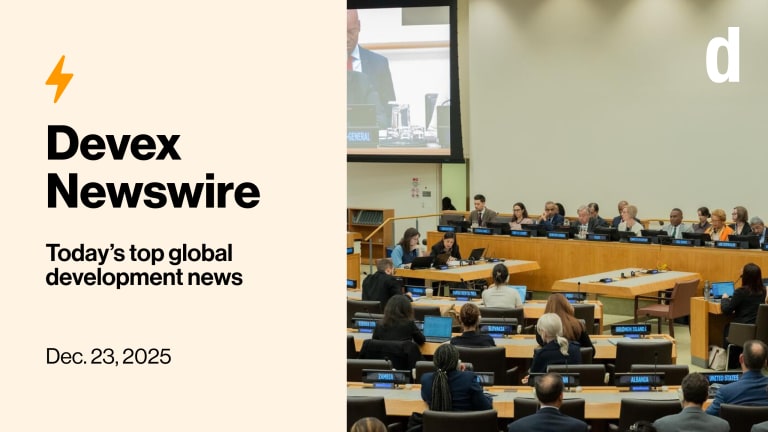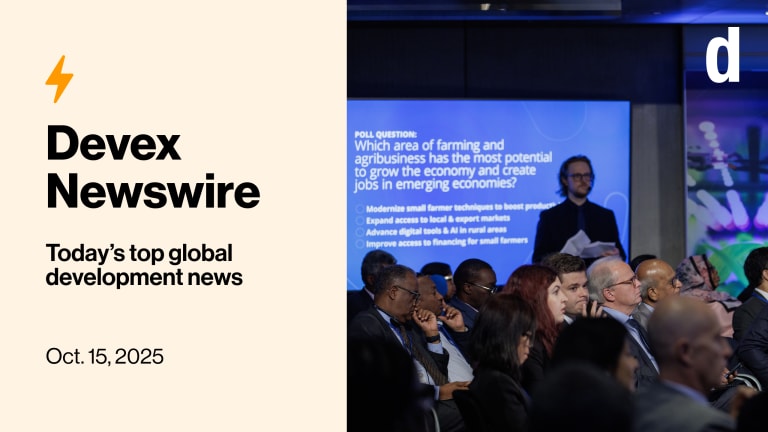
Six months after pledging billions to the World Bank’s IDA fund, the United Kingdom is reconsidering. While critics warn it signals a retreat from global leadership and undermines aid priorities, officials say options are being explored. Still, cuts to multilateral funds appear likely.
Also in today’s edition: Famine looms in Gaza, PEPFAR cuts are already hurting Uganda, and an aid rethink in Europe.
This is a preview of Newswire
Sign up to this newsletter for an inside look at the biggest stories in global development, in your inbox daily.
+ You are invited to join our global health reporting team in person in Geneva or online from May 19 to 22 as we host a series of events and roundtables on the sidelines of the 78th World Health Assembly to tackle and explore solutions to some of the most pressing issues in global health alongside sector policymakers and influencers.
Listen to the latest episode of our podcast series for a preview of what to expect at WHA78.
Billion-pound backpedal?
Just six months after pledging nearly £2 billion to the International Development Association, or IDA, the World Bank’s fund for the world’s low-income countries, the U.K. is now reviewing that promise — and development leaders are not holding back, writes Susannah Birkwood for Devex.
Last November, the U.K. proudly announced a £1.98 billion commitment to IDA’s 21st replenishment, calling it proof that “Britain is back with a voice on the world stage.” But after slashing its aid budget to 0.3% of national income in February, the government may be forced to backtrack. The World Bank now says the pledge is “currently under review.”
Cue the backlash. “The grim reality of the aid cuts is emerging,” says Richard Watts of Save the Children UK. “This is a significant move that … sends a troubling signal about the U.K.’s retreat from global leadership.”
Adrian Lovett of the ONE Campaign calls it “the first sign of the devastating implications of the Prime Minister’s massive cut.” Unless the 40% aid reduction is reversed, “there simply will not be enough money” to keep the pledge without cutting other vital programs.
Sarah Champion, chair of the U.K. Parliament’s development committee, says she is “concerned,” while Gideon Rabinowitz of Bond warns the government’s development priorities are already being undermined.
Behind the scenes, options are being floated — stretching payments, offering a loan, or even dipping into the Exchange Equalisation Account, a reserve fund. “They will be looking at all these options to try and meet the £1.98 billion, because it will be embarrassing if they can’t,” says Watts.
Some, such as Ian Mitchell of the Center for Global Development, see the review as a pressure tactic to rein in spiraling domestic asylum costs, which ate up 20% of the U.K.’s aid budget in 2024. He believes the Treasury still views IDA as a smart, efficient way to deliver impact: “Even with a 0.3% budget, the U.K.’s IDA pledge would not be historically large. ... It would be around 7% in 2027.”
U.K. development minister Jenny Chapman confirmed to members of Parliament that multilateral funds are indeed on the chopping block. “In a world where we’re losing almost half the budget, everybody gets a cut basically.”
Read: Will the UK renege on its pledge to IDA?
Resist and reinvent
Europe’s aid scene is at a crossroads. At a recent Devex Pro event ahead of the Fourth International Conference on Financing for Development, or FfD4, in Seville, Spain, two heavyweights — Germany’s former development minister Heidemarie Wieczorek-Zeul and Enabel CEO Jean Van Wetter — called out the limits of both traditional aid and pure private-sector approaches. Their verdict? It’s time to mix the best of both.
“We live in a pivotal moment in the history of international cooperation,” Van Wetter said. His mantra: Resist and reinvent. “Resist the movement against what we believe and our values,” he urged, but also reinvent, “because the geopolitical context has changed.” Wieczorek-Zeul agreed, warning that narrowing Europe’s focus to migration control would be “a dangerous mistake.” Instead, she insisted, “the greatest challenge is the transformation in a social just and ecological way for our planet.”
They pushed back on the idea that Europe’s new Global Gateway and similar strategies are purely self-serving, writes my colleague Jesse Chase-Lubitz. “The ‘Global Gateway' didn’t start under Trump,” Van Wetter pointed out, stressing that the EU aims for mutual partnerships, not just its own gain. Still, both urged Europe to stop talking in jargon and start telling a story people actually understand. “People don’t really understand what we do. … And we are partly responsible for that,” he admitted.
With aid budgets shrinking, they argued for bold new alliances — vaccine manufacturing in Africa, green hydrogen deals — and fresh coalitions that include private firms and philanthropies, without losing sight of core goals. But, Wieczorek-Zeul warned that private sector engagement cannot replace public development finance. As they look to Seville, both see a unique chance to unite Europe, Africa, and emerging donors; tackle unfair trade rules; and even rethink sector careers: “Would you want to work in this sector if you think that there is no future in this sector?” Van Wetter asked. Now’s the time to prove there is.
Read: Europe’s development leaders call for rethink on aid and partnerships (Pro)
+ As we prepare for FfD4, starting next month, we’ve lined up a series of Pro briefings to discuss the changing role of development finance in the sector. On May 28, Vera Songwe, Homi Kharas, and Rick Samans will join us to explore how multilateral development banks can fill the gaps in this era of massive cuts to traditional aid. Save your spot now.
This event is exclusive to Devex Pro members. Not yet gone Pro? Start a 15-day free trial now to access all the content and events available to Pro readers.
A seat at the table
The European Bank for Reconstruction and Development held its annual meetings this week, concluding yesterday, and one of the key themes was a planned expansion into sub-Saharan Africa, my colleague David Ainsworth tells me.
EBRD has historically focused on Eastern Europe and Central Asia, but it has already welcomed Benin, Côte d’Ivoire, and Nigeria as new shareholders. The bank's first operations in these countries will follow shortly.
Senegal, Kenya, and Ghana are currently going through a membership process. Separately, the bank is growing in the Middle East, and Iraq has been accepted as a shareholder.
It's a rare bit of good news for development on the African continent, which has been hit by a series of funding cuts as Western nations pull official development assistance funding, for a mixture of financial and ideological reasons.
Bank staff were keen to use the meeting to talk about how they will take an open approach and listen to local civil society leaders.
At a session in the heart of the London banking district, Heike Harmgart, EBRD’s first managing director for sub-Saharan Africa, outlined plans to have locally based staff, from Abidjan to Accra, while several civil society leaders extolled the importance of local leadership at an early stage.
After a period where localization has seemed to have taken a back foot, not least due to the demise of USAID, its flag bearer among Western donors, it was encouraging to hear speakers talk about how local leadership was being driven forward.
Thin on the ground, however, were representatives of actual African civil society organizations. For some civil society observers, their absence — at an event focused around expansion into Africa — raised some eyebrows.
ICYMI: Nigeria becomes EBRD shareholder as it continues African expansion (Pro)
Famine by blockade
Gaza’s 2.1 million people face extreme hunger, with 1 in 5 on the brink of starvation as Israel blocks aid. The risk of starvation and death is no longer theoretical, experts warn.
A report by the Integrated Food Security Phase Classification, or IPC, confirms famine conditions are near, writes my colleague Ayenat Mersie. “Immediate action is essential to prevent further deaths,” it says. Aid is ready but stuck. “Families in Gaza are starving while the food they need is sitting at the border,” says the World Food Programme’s Cindy McCain.
“The situation is becoming unbearable,” Oxfam’s Mahmoud Alsaqqa tells Ayenat from Gaza. Prices in local markets have skyrocketed. IPC reports that wheat flour is now priced up to $520 per 25 kilograms in some areas. “We used to have it for $15,” Alsaqqa says. Half of Gaza’s community kitchens have closed.
Nearly 71,000 children also face acute malnutrition. “Hundreds more children in desperate need of treatment are not able to access it due to the insecurity and displacement,” says UNICEF’s Catherine Russell. Meanwhile, aid plans remain unclear. “Everything is vague,” Naser Qadous, who works at Middle East-focused aid organization Anera, says. “We are not able to plan.”
“These numbers are not just statistics,” says Gaza City gynecologist Dr. Amjad Al-Muzaini, who notes that babies are increasingly being born underweight. “They indicate a dire nutritional crisis.”
Read: Famine stalks Gaza as Israel blocks aid at the border
+ For more content like this, sign up to Devex Dish, a weekly newsletter on the transformation of the global food system.
The human cost
In Uganda, service providers warn U.S. aid cuts are already claiming lives. Lydia Nabirye, 28, died after losing access to a mental health program that had helped her stick to HIV treatment. “No one had died,” Elon Musk, who led the department that oversaw the dismantling of USAID programs, had tweeted weeks earlier.
U.S. President Donald Trump’s funding freeze on global HIV/AIDS programs has shuttered support for the most vulnerable, writes Andrew Green for Devex. “When you get to this particular point,” says Hajjati Abdul Jamal, a trans woman and organizer for Uganda’s marginalized communities, “it means erasing the existence of us.”
MUCOBADI, the nonprofit which supported Lydia, was defunded despite being backed by PEPFAR — the U.S. HIV/AIDS program credited with saving 26 million lives. Lydia had begun to recover with daily visits from a care worker. “She told me she wanted to treat people in the community,” says Fatuma Bilibawa. But once support ended, she stopped treatment and died.
Across Uganda, groups such as MUCOBADI and clinics for drug users have closed or operate in limbo.
Wamala Twaibu’s clinic saw 200 overdoses after funding was cut. It has since reopened, but he’s bracing for another shutdown. Clients “are aware … The last time [the clinic shut down] they suffered,” and are preparing to suffer again, says Twaibu.
At home, Lydia’s mother, Saida, is now raising her grandson alone. “There are no services to help me,” she says. “I am all alone.”
Read: Following PEPFAR cuts, vulnerable Ugandans are dying, providers say
+ For the latest in global health, sign up to Devex CheckUp, a free newsletter.
In other news
A polio outbreak has been declared in Papua New Guinea as the World Health Organization urges for an immediate vaccination campaign. [BBC]
Colombia is the latest Latin American country to join China’s Belt and Road initiative. [DW]
Almost 64% of adults across 22 countries in the Arab region have little to no access to financial services, according to a report. [UN News]
Sign up to Newswire for an inside look at the biggest stories in global development.








